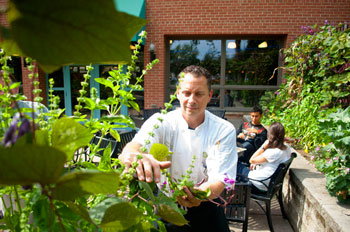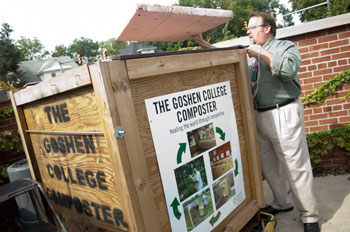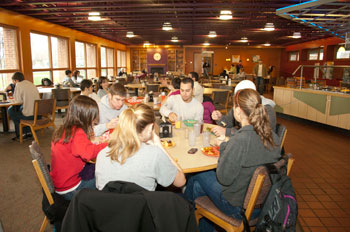Tuesday, November 30, 2010
Beyond burgers and fries: Campus dining hall incorporates care for the earth and students' bodies

Chef Jeremy Corson cuts produce from a small garden he had around a patio eating area during the late fall.
» View more photos from the GC Dining Hall.
» Listen to a podcast about the dining hall's sustainability features (created by Laurelville Mennonite Church Center)
The Goshen College dining hall service includes gourmet food that is prepared right in front of students at stations; a commitment to whole or multi grains, and as much local and organic food as is possible; food options for persons with special dietary needs, such as vegans, vegetarians, persons with allergies to nuts, dairy or gluten; and the incorporation of recipes from around the world.
Stealth health
As he plans the menus, the dining hall's director Bob
Rombach implements AVI Fresh's approach of focusing on
"stealth health." They know that college students enjoy
comfort foods and foods typically high in fat and sugar, so there
is often pasta available and pizza, but made with whole or
multi-grain flour. "We are not just about appealing to
people's desires, but also to their needs," Rombach said,
noting that the chef doesn't use any trans fats and often
replaces sugar with fruit juice to sweeten desserts.
 The "stealth health" approach also includes having
many foods labeled with nutritional information; preparing a salad
bar with 58 items, including tofu, spinach, feta cheese and nuts;
changing the menu seasonally; making most of their own bread from
scratch; and using a lettuce mix that offers more crunch, moisture
and variety than typical iceberg lettuce alone.
The "stealth health" approach also includes having
many foods labeled with nutritional information; preparing a salad
bar with 58 items, including tofu, spinach, feta cheese and nuts;
changing the menu seasonally; making most of their own bread from
scratch; and using a lettuce mix that offers more crunch, moisture
and variety than typical iceberg lettuce alone.
This kind of variety is also central to AVI Fresh's approach. They are always incorporating new recipes, including authentic international recipes. And "presentation for us is everything," Rombach said. "Your eyes decide what you want to eat. Everything has to look appealing, even the hummus." So, the chef uses roasted garlic and parsley in the hummus that is served. In addition, the chef marinates meats and properly cuts vegetables. "It is important to regard and respect them from the beginning," Rombach said.
AVI Fresh also knows that the equipment that is used makes a big difference in the quality of the food served. When they were first getting started at Goshen, Rombach bought a meat tenderizer for the kitchen, so that fresh meat can be used rather than frozen meat. As well, they have a breading machine that they use on fresh cut chicken, instead of the frozen pre-breaded chicken tenders that are much more commonly served in institutional kitchens.
Sustainable dining
But the dining hall doesn't just offer good tasting food
that is healthy for students. "I believe in a green program
and I love that my company promotes that," said Rombach, who
came to this position after years of working the fine dining
restaurant industry and then several years at Kenyon College, where
the dining hall was known for its emphasis on sustainability.
"We are not here to just feed these people," he said. "We are here to offer them an experience."
During 2010, the dining hall managed a little garden around a patio eating area that was both beautiful and provided regular contributions to meals, especially herbs. Daily, chef Jeremy Corson – whose mother initially planted the garden – would go right outside the dining hall and cut basil for pizzas, kale for a stir-fry and flowers for decoration.
And Corson is already planning the 2011 garden. "It will have vining purple beans again for sure," he said. "I think we'll be able to totally enclose the patio for a private outdoor escape and there will be more grape tomatoes and kohlrabi."
 Though students might still refer to the college's dining
hall affectionately as the "'Rot" (based on the name
of a former food service company), the only thing rotting in the
Goshen College Dining Hall is the compost collected through a
program that students and dining hall employees collaborate on.
This includes the "pre-consumer waste" from the kitchen
preparation and the "post-consumer waste" of food not
eaten by students. A station has been set-up for students to divide
their waste into bins, which student volunteers from the Eco-PAX
Club and the dining hall employees take out to a giant composter
outside daily (created by adjunct professor and composting expert
Lew Naylor). Once all of the food is broken down, the compost is
then used on campus as a fertilizer. Previously, about 950 pounds
of compostable material was thrown out in the trash each day.
Though students might still refer to the college's dining
hall affectionately as the "'Rot" (based on the name
of a former food service company), the only thing rotting in the
Goshen College Dining Hall is the compost collected through a
program that students and dining hall employees collaborate on.
This includes the "pre-consumer waste" from the kitchen
preparation and the "post-consumer waste" of food not
eaten by students. A station has been set-up for students to divide
their waste into bins, which student volunteers from the Eco-PAX
Club and the dining hall employees take out to a giant composter
outside daily (created by adjunct professor and composting expert
Lew Naylor). Once all of the food is broken down, the compost is
then used on campus as a fertilizer. Previously, about 950 pounds
of compostable material was thrown out in the trash each day.
In addition, the dining hall doesn't use trays, so there is less waste and water used (though there are some available upon request). And the dining hall doesn't use disposables and when they are catering across campus, they offer biodegradable disposables.
A team that cares
 The dining hall also has particular concern for the students and
their overall well-being. "We are trying to provide a comfort
experience – an essence of someone caring for them
individually," said Rombach.
The dining hall also has particular concern for the students and
their overall well-being. "We are trying to provide a comfort
experience – an essence of someone caring for them
individually," said Rombach.
In training his staff, Rombach made sure that the first person who greets students – currently Trudy or Elsie – is someone who is warm and friendly, and remembers their names and the personal tidbits about their lives. "I love that my employees are invested in these students beyond feeding them," he said.
After rattling off a list of his employees, Rombach notes that the quality of service they provide is based both on the larger vision of the company and how it is carried out daily by his team. "Their jobs, dedication to service and their training define them, and the excellent work they do," he said.
Rombach and his crew seem to have found a good home at Goshen in bringing fresh, healthy and local food to students' plates everyday – even a special international Thanksgiving feast right before students headed home for the holiday.
"I love GC students," said Rombach. "They have a sense of the global community and a responsibility to others without reward. It gives me hope. I love that I feed these people; it makes me feel part of them."
– By Jodi H. Beyeler
Editors: For more information about this release, to arrange an interview or request a photo, contact Goshen College News Bureau Director Jodi H. Beyeler at (574) 535-7572 or jodihb@goshen.edu.
###
Goshen College, established in 1894, is a residential Christian liberal arts college rooted in the Anabaptist-Mennonite tradition. The college's Christ-centered core values – passionate learning, global citizenship, compassionate peacemaking and servant-leadership – prepare students as leaders for the church and world. Recognized for its unique Study-Service Term program, Goshen has earned citations of excellence in Barron's Best Buys in Education, "Colleges of Distinction," "Making a Difference College Guide" and U.S. News & World Report's "America's Best Colleges" edition, which named Goshen a "least debt college." Visit www.goshen.edu.

 E-mail this story
E-mail this story